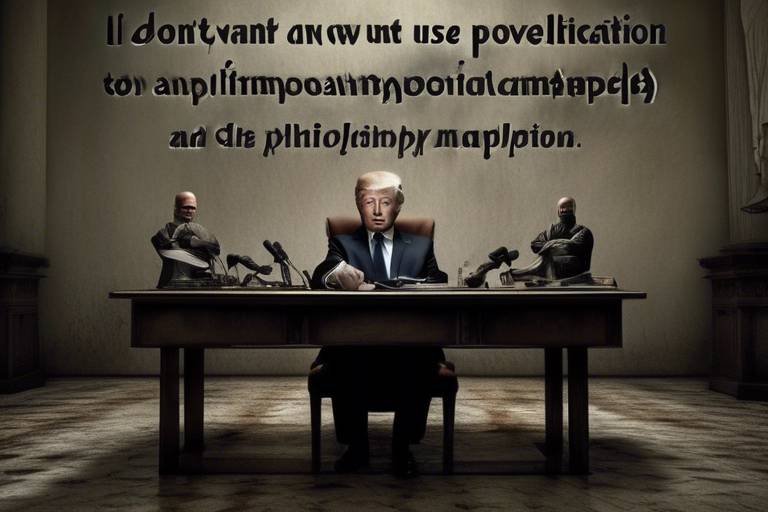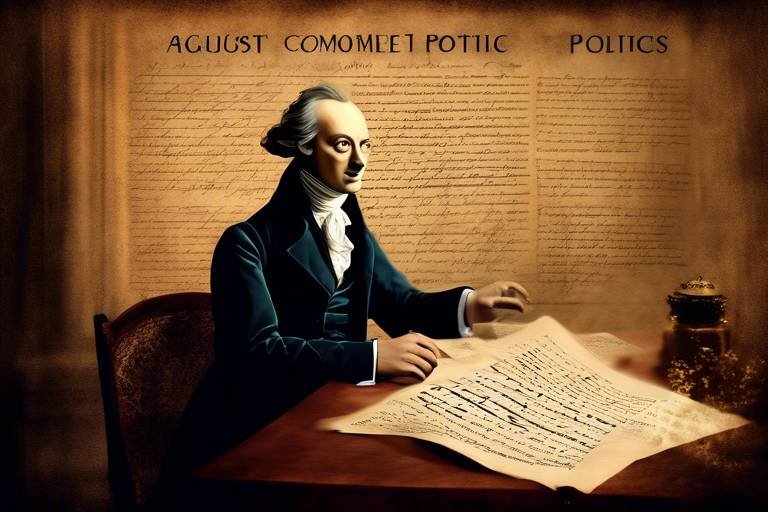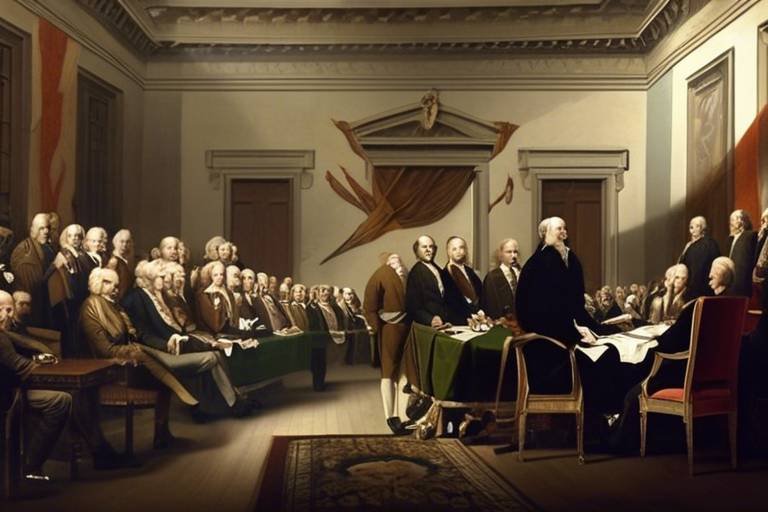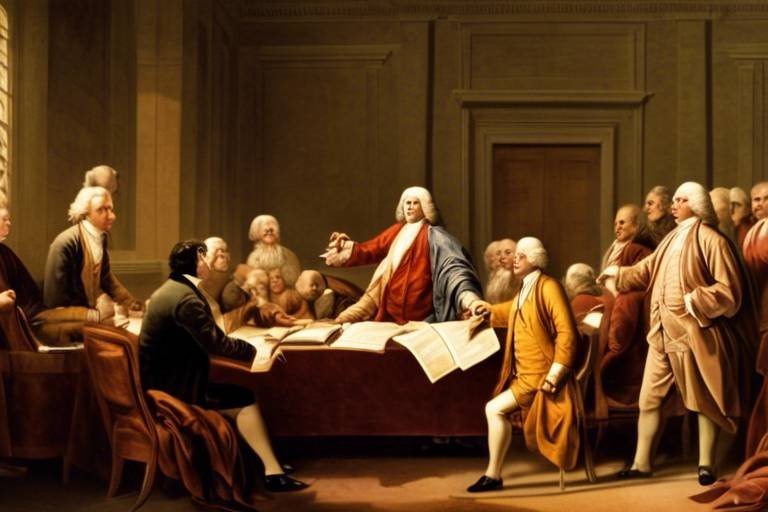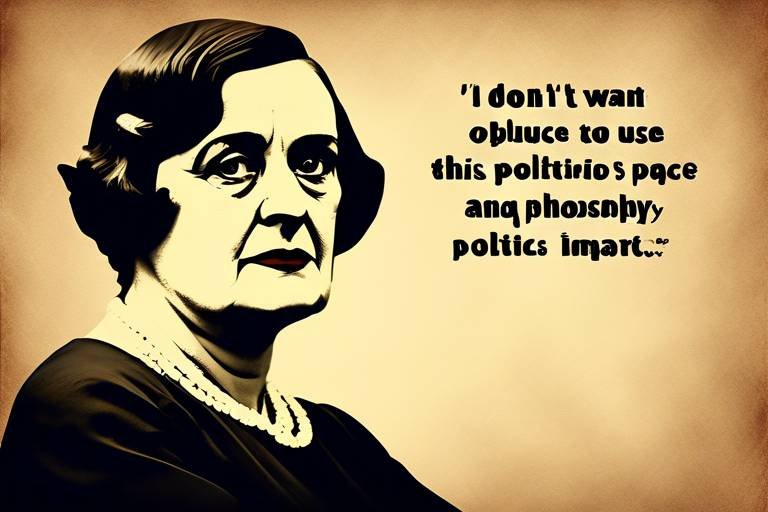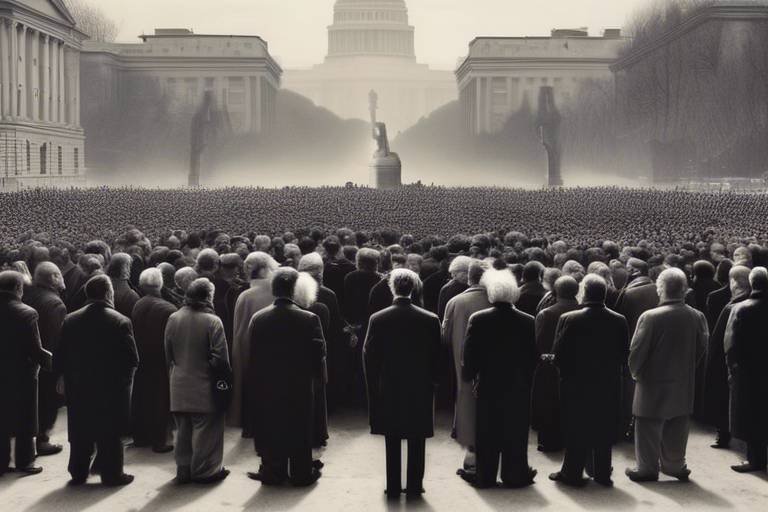Decoding the Philosophy behind Political Satire
Political satire is more than just a clever jab at politicians; it's a complex interplay of philosophy, humor, and social critique. At its core, political satire serves as a mirror reflecting the absurdities and contradictions of governance, prompting us to question the very foundations of authority. Have you ever laughed at a political cartoon only to find yourself pondering the deeper implications of its message? That's the power of satire—it entertains while simultaneously challenging our perceptions. By dissecting the philosophical underpinnings of political satire, we can better appreciate its role in shaping public discourse and influencing societal values.
Throughout history, satire has been a potent weapon against tyranny and oppression. From the ancient Greeks, who used comedy to critique their leaders, to modern-day comedians taking aim at political figures, the essence of satire has remained the same: to provoke thought and inspire change. It’s like a double-edged sword—on one side, it makes us laugh, and on the other, it encourages us to reflect on the absurdities of our political landscape. Understanding this relationship between philosophy and satire reveals why it continues to resonate with audiences today.
Moreover, the impact of political satire extends beyond mere entertainment. It plays a crucial role in democratizing information and making complex political issues more relatable. By using humor, satirists can break down intricate topics into digestible pieces, allowing the average person to engage with politics without feeling overwhelmed. This accessibility is vital, especially in a world where political apathy is rampant. So, the next time you chuckle at a satirical sketch, remember that you're not just laughing—you're participating in a long-standing tradition of questioning authority and advocating for change.
As we delve deeper into the relationship between philosophy and political satire, we will explore how various comedic techniques, such as irony and absurdity, serve as powerful tools for social critique. We'll also examine the ethical implications of satire and its role in challenging power dynamics. In an age where digital platforms are reshaping how we consume information, understanding the future of political satire is more important than ever. So, buckle up as we embark on this journey to decode the intricate philosophy behind political satire!
- What is political satire? Political satire is a form of humor that uses exaggeration, irony, and absurdity to critique politics and societal issues.
- How does satire influence public opinion? Satire can shape public opinion by making complex political issues more relatable and engaging, often provoking thought and discussion among audiences.
- Are there ethical concerns related to political satire? Yes, satirists face ethical dilemmas regarding the potential impact of their work on public discourse and the responsibilities they hold toward their subjects.
- How has digital media changed political satire? Digital platforms have expanded the reach of political satire, allowing it to spread quickly and engage a broader audience, but also raising questions about misinformation and context.

The Historical Roots of Political Satire
Political satire is not just a modern phenomenon; it has deep historical roots that trace back to ancient civilizations. From the biting critiques of Greek playwrights to the sharp quills of Renaissance satirists, the art of satire has long served as a mirror reflecting societal norms, governance, and the follies of authority. It’s fascinating to see how this form of expression has evolved, adapting to the cultural and political climates of different eras.
In ancient Greece, playwrights like Aristophanes utilized humor and satire to challenge political figures and societal norms. His plays often mocked the politicians of his time, exposing their incompetence and moral failings. This early form of satire was not merely for entertainment; it was a crucial vehicle for public discourse and critique. Similarly, in ancient Rome, Juvenal and Horace crafted satirical poems that addressed the corruption and excesses of the ruling class, laying the groundwork for future satirical expressions.
As we move through history, the Middle Ages saw a shift in the style of satire. The rise of the printing press in the 15th century revolutionized the dissemination of satirical works. Pamphlets and broadsheets became popular, allowing satirists to reach a broader audience. Figures like Jonathan Swift emerged during the 18th century, using satire to comment on issues such as poverty and politics. His work, A Modest Proposal, remains a quintessential example of how satire can shock and provoke thought.
The 19th century brought about a golden age for political satire, especially with the advent of cartoons and illustrations in publications like Punch and The New Yorker. These platforms allowed artists to visually critique political figures and social issues, making satire more accessible to the general public. The use of caricature became a powerful tool, distilling complex political issues into digestible, humorous images that resonated with audiences.
In the 20th century, the landscape of political satire continued to evolve with the rise of television and later, the internet. Shows such as Saturday Night Live and The Daily Show brought political satire into living rooms, engaging viewers in a dialogue about current events through humor. This shift not only broadened the audience but also transformed satire into a significant component of political discourse.
Today, political satire exists in myriad forms, from social media memes to late-night talk shows. The digital age has democratized satire, allowing anyone with internet access to participate in this age-old art form. As we look back at the historical roots of political satire, it's clear that its purpose has remained consistent: to challenge authority, provoke thought, and entertain. The evolution of this genre reflects the changing dynamics of society and the enduring need for critique and reflection.
| Era | Key Figures | Notable Works | Impact |
|---|---|---|---|
| Ancient Greece | Aristophanes | The Clouds | Critique of Socrates and Athenian politics |
| Ancient Rome | Juvenal, Horace | Satires | Commentary on corruption and excess |
| 18th Century | Jonathan Swift | A Modest Proposal | Provoked thought on poverty and politics |
| 19th Century | Various cartoonists | Punch | Visual satire of political figures |
| 20th Century | Various TV shows | SNL, The Daily Show | Engaged audiences in political discourse |
| Digital Age | Online creators | Memes, YouTube channels | Democratized satire; broad audience reach |

The Role of Humor in Political Satire
Humor is not just a side dish in the grand banquet of political satire; it’s the main course that makes the entire meal palatable. Think about it: politics can often be a heavy, convoluted topic that makes our heads spin. Yet, when humor is sprinkled into the mix, it transforms the discourse into something more digestible, engaging, and even entertaining. It’s like adding a splash of lemon to a rich sauce—it brightens everything up! The beauty of humor in political satire lies in its ability to serve as a bridge between complex political issues and the everyday person.
At its core, humor serves a dual purpose in political satire. First, it acts as a tool for critique. By employing humor, satirists can point out the absurdities and contradictions within political systems without coming off as overly aggressive or confrontational. This is crucial because it allows audiences to reflect on serious issues without feeling defensive. After all, who doesn’t enjoy a good laugh? When a comedian pokes fun at a politician’s blunders, it creates a space for dialogue, encouraging viewers to think critically about the issues presented.
Secondly, humor fosters engagement. It invites audiences to participate in the conversation rather than just passively consuming information. When people laugh, they’re more likely to remember the message being conveyed. This is particularly important in an age where attention spans are shorter than ever. By wrapping serious political commentary in a humorous package, satirists can captivate their audience and make them more receptive to the underlying messages. It’s like wrapping a bitter pill in chocolate—much easier to swallow!
Moreover, the types of humor used in political satire can vary widely, each with its unique effectiveness. Here are a few examples:
- Irony: This technique highlights the discrepancies between what is said and what is meant, often revealing deeper truths about political narratives.
- Absurdity: By exaggerating situations to the point of ridiculousness, absurdist humor can illuminate the flaws in political actions and beliefs.
- Parody: Mimicking the style of political figures or media outlets can expose their shortcomings and biases in a humorous light.
In essence, the role of humor in political satire is multifaceted. It’s not just about making people laugh; it’s about opening their eyes to the ridiculousness of certain political situations and encouraging them to engage in meaningful discussions. In this way, humor becomes a powerful weapon in the arsenal of political discourse, allowing satirists to challenge the status quo while keeping their audience entertained.
Q: Why is humor effective in political satire?
A: Humor makes complex political issues more accessible and engaging, allowing audiences to reflect on serious topics without feeling defensive.
Q: What types of humor are commonly used in political satire?
A: Common types of humor include irony, absurdity, and parody, each serving to highlight different aspects of political narratives.
Q: How does political satire influence public opinion?
A: By presenting political issues in a humorous light, satire can shape public perception and promote critical thinking among audiences.

Types of Humor Used in Satire
Political satire is a vibrant tapestry woven from various strands of humor, each contributing to its unique ability to provoke thought and entertain. It’s not just about making people laugh; it’s about making them think critically about the world around them. The types of humor employed in satire can range from the subtle to the overt, each with its own flavor and impact. Here are a few key types:
- Irony: This is perhaps the most recognized form of humor in satire. Irony occurs when there is a stark contrast between expectations and reality. For example, a politician who campaigns on a platform of transparency while being embroiled in scandals is ripe for ironic commentary. This type of humor forces audiences to confront the discrepancies in political narratives.
- Exaggeration: Often, satirists will take a political situation or a personality and blow it out of proportion to highlight its absurdity. Think of a caricature artist who emphasizes a politician's most recognizable features, making them larger than life. This exaggeration not only entertains but also shines a light on the ridiculousness of certain behaviors or policies.
- Absurdity: Absurdist humor takes the cake in absurd situations that defy logic or reason. It often involves presenting political scenarios that are so outrageous, they become laughable. This type of humor can be particularly effective in revealing the flaws in political ideologies or actions that seem irrational.
- Parody: Parody involves mimicking the style of a particular genre or work to create a humorous effect. Political parodies can take the form of songs, videos, or written pieces that imitate the tone and style of political speeches or campaigns, making them relatable and entertaining.
- Satirical News: With the rise of platforms like The Onion or Saturday Night Live’s “Weekend Update,” satirical news has become a staple. This type of humor presents fabricated news stories that, while fictional, often reflect real-life events in a way that exposes their absurdity.
Each of these humor types serves a specific purpose in the realm of political satire. They allow satirists to engage audiences in a dialogue about serious issues while keeping the tone light. For instance, irony not only entertains but also encourages viewers to question the integrity of their leaders. Exaggeration can make a complex issue more digestible, turning dense political jargon into something that resonates with the everyday person.
Moreover, the effectiveness of these humor types often depends on the context in which they are delivered. A well-timed ironic remark can resonate more profoundly during a political scandal than during a mundane policy discussion. Similarly, absurdity can shine in times of political turmoil, where the ridiculousness of a situation becomes painfully clear. By understanding these nuances, we can appreciate how humor in satire does more than just elicit laughter; it serves as a powerful tool for social commentary and change.
In conclusion, the types of humor used in political satire are not just mere tricks of comedy; they are essential components that help shape public discourse. By employing irony, exaggeration, absurdity, parody, and satirical news, satirists can dissect complex political landscapes and make them accessible to a broader audience. This interplay of humor and critique not only entertains but also empowers viewers to engage with the political world more thoughtfully.
Q1: What is the primary purpose of political satire?
A1: The primary purpose of political satire is to critique and expose the flaws in political systems, leaders, and ideologies while engaging audiences through humor.
Q2: How does humor enhance the effectiveness of political satire?
A2: Humor makes complex political issues more relatable and digestible for audiences, encouraging critical thinking and discussion in an entertaining manner.
Q3: Why is irony such a powerful tool in political satire?
A3: Irony highlights contradictions in political narratives, prompting audiences to question the integrity and actions of political figures.
Q4: Can satire influence public opinion?
A4: Yes, satire can significantly influence public opinion by shaping perceptions of political figures and events, often swaying audiences toward a particular viewpoint.

Irony as a Satirical Device
Irony, in the realm of political satire, serves as a powerful lens through which we can scrutinize the absurdities of political narratives and the contradictions that often define them. It’s like holding up a mirror to society, reflecting not just the surface but the deeper, often uncomfortable truths lurking beneath. When a satirist employs irony, they are not merely making a joke; they are inviting the audience to engage in a dialogue about the inconsistencies inherent in political discourse.
Consider how irony can highlight the disparity between what politicians say and what they actually do. For instance, a politician who champions environmental protection while simultaneously endorsing policies that harm the environment embodies a classic irony that satirists love to exploit. This juxtaposition not only elicits laughter but also provokes critical thought about the sincerity of political intentions. In this way, irony becomes a tool for accountability, prompting audiences to question the integrity of their leaders.
Moreover, irony can manifest in various forms, each with its own unique flavor and impact. Here are a few types of irony commonly found in political satire:
- Verbal Irony: This occurs when someone says the opposite of what they mean, often to emphasize a point. For example, a satirist might say, “What a great job our leaders are doing!” while showcasing a series of political blunders.
- Situal Irony: This type reveals a stark contrast between what is expected to happen and what actually occurs. A politician promising change while maintaining the status quo is a classic example.
- Dramatic Irony: In this scenario, the audience knows something that the characters do not. In political satire, this can be used to highlight the foolishness of a leader’s decisions.
Through these forms of irony, satirists can dissect political issues in a way that is both entertaining and enlightening. The effectiveness of irony lies in its ability to engage the audience’s intellect while simultaneously appealing to their sense of humor. It’s a delicate dance where the satirist walks the fine line between jest and critique, often leaving audiences both amused and contemplative.
Furthermore, irony has the power to disarm. When a satirist uses humor to expose the flaws in political arguments, it can make the critique more palatable for the audience. Instead of feeling attacked or defensive, people are more likely to reflect on the irony presented. This is particularly important in today’s polarized political climate, where discussions can quickly devolve into hostility. Irony allows for a more nuanced conversation, encouraging individuals to reconsider their views without feeling directly confronted.
In summary, irony is not just a comedic device; it is a vital component of political satire that enriches the discourse surrounding governance and authority. By employing irony, satirists challenge audiences to think critically about the messages being conveyed by those in power, ultimately fostering a more informed and engaged citizenry. As we continue to navigate the complexities of modern politics, the role of irony in satire remains as relevant as ever, reminding us that laughter can indeed be a powerful catalyst for change.
What is political satire?
Political satire is a genre of humor that critiques political figures, policies, and events, often using exaggeration, irony, and absurdity to highlight flaws and provoke thought.
How does irony function in political satire?
Irony in political satire serves to expose contradictions between what is said and what is done, encouraging audiences to question political narratives and engage in critical thinking.
Can political satire influence public opinion?
Yes, political satire can significantly influence public opinion by shaping perceptions of political figures and issues, often making complex topics more accessible and engaging for the audience.
Why is humor important in political discourse?
Humor serves as a tool for critique, allowing audiences to digest complex political issues in a more approachable way, fostering discussion and reflection.

Absurdity in Political Commentary
Absurdity in political commentary serves as a powerful lens through which we can examine the often ludicrous nature of political discourse. Imagine a world where the most outrageous claims and actions by politicians are not just met with disbelief but are amplified to highlight their ridiculousness. This is where absurdist satire shines, using exaggerated scenarios and surreal situations to expose the flaws and contradictions inherent in political systems. It’s like holding up a mirror to society, but instead of a clear reflection, we see a distorted, exaggerated version that reveals uncomfortable truths.
At its core, absurdity in political satire takes the mundane and elevates it to the bizarre, making us question the very fabric of our political reality. For instance, consider the scenario where a politician promises to solve complex issues with overly simplistic solutions. An absurdist satirist might depict this politician as a magician pulling rabbits out of hats, suggesting that their promises are as fantastical as magic tricks. Such imagery not only entertains but also provokes critical thinking about the feasibility of political promises.
Moreover, absurdity allows audiences to engage with political commentary in a way that is both entertaining and thought-provoking. When faced with the absurd, people are often more willing to reflect on the implications of political actions without the weight of traditional rhetoric. It creates a space where laughter and critical thought coexist, leading to a deeper understanding of the political landscape. For example, television shows like “Saturday Night Live” and “The Daily Show” utilize absurdity to dissect current events, making serious commentary palatable through humor.
Furthermore, absurdity in political satire can serve as a form of social critique. By exaggerating the absurdities of political behavior, satirists can highlight societal issues that may otherwise go unnoticed. This technique encourages audiences to question the status quo and consider alternative perspectives. In doing so, it fosters a culture of skepticism towards authority and encourages civic engagement. In a world where political narratives can often seem scripted and rehearsed, absurdity cuts through the noise, revealing the underlying absurdity of it all.
In conclusion, the use of absurdity in political commentary not only entertains but also serves as a crucial tool for social critique. By presenting the ridiculousness of political actions and statements, absurdist satire encourages audiences to engage critically with the political landscape. It acts as a catalyst for discussion, pushing us to reflect on the nature of power, governance, and our roles as informed citizens. As we continue to navigate complex political realities, the absurd may just be the lens through which we find clarity.
- What is absurdity in political satire? Absurdity in political satire refers to the use of exaggerated or surreal situations to highlight the ridiculousness of political actions and statements.
- How does absurdity help in understanding political issues? By presenting political issues in an exaggerated manner, absurdity encourages audiences to think critically and reflect on the implications of political behavior.
- Can absurdity lead to social change? Yes, by highlighting the flaws in political systems, absurdist satire can inspire audiences to question authority and engage in civic action.

Audience Reception of Political Satire
When it comes to political satire, the audience plays a pivotal role in its effectiveness and impact. The way people perceive and interpret satirical content can vary dramatically based on numerous factors, including cultural background, political beliefs, and personal experiences. Have you ever watched a satirical show and found yourself laughing hysterically while your friend sat in silence? That’s the beauty—and sometimes the challenge—of political satire. It can resonate with some while leaving others bewildered.
One of the fascinating aspects of audience reception is how it can be influenced by the medium through which satire is delivered. For instance, television shows like Saturday Night Live or The Daily Show have cultivated a particular audience that expects a blend of humor and critique. In contrast, satirical articles published online may attract readers who prefer a more in-depth analysis of political situations. This difference in format can lead to varying levels of engagement and understanding.
Moreover, demographics play a significant role in how satire is received. Younger audiences, who are often more attuned to digital content, may respond more favorably to memes and short video clips that convey political jokes. In contrast, older generations might gravitate toward traditional forms of satire, such as editorial cartoons or satirical novels. This generational gap is crucial for understanding the broader implications of political satire in society.
Interestingly, audience reception can also be influenced by the political climate. During times of political unrest or significant events, satirical content may gain traction as a form of coping mechanism. People often turn to humor as a way to process complex emotions and make sense of chaotic situations. In such cases, satire becomes not just a tool for critique but also a means of solidarity among those who share similar frustrations.
To illustrate how audience reception varies, consider the following table that summarizes different audience demographics and their preferred forms of political satire:
| Demographic Group | Preferred Medium | Typical Response |
|---|---|---|
| Young Adults (18-30) | Memes, Short Videos | Highly Engaged, Shares Content |
| Middle-Aged Adults (31-50) | TV Shows, Podcasts | Analytical, Discusses in Groups |
| Older Adults (51+) | Editorials, Books | Reflective, Less Likely to Share |
In conclusion, the reception of political satire is a complex interplay of various factors that shape how messages are conveyed and understood. It’s not merely about the punchline; it’s about the audience's background, the context in which the satire is presented, and the prevailing political atmosphere. As we continue to navigate the ever-changing landscape of political discourse, understanding audience reception will be crucial for satirists aiming to make a meaningful impact.
- What is political satire? Political satire is a form of humor that critiques political figures, events, and ideologies, often using exaggeration and irony.
- How does audience perception affect political satire? Audience perception can significantly influence how satire is received, with factors like demographics and cultural background playing key roles.
- Why is humor important in political satire? Humor makes complex political issues more accessible and engaging, allowing audiences to reflect on serious topics in a lighter context.
- Can political satire lead to social change? Yes, satire can challenge power structures and provoke discussions that may lead to social change.

The Philosophical Underpinnings of Satire
Political satire is not just a form of entertainment; it's a complex tapestry woven from various philosophical threads. At its core, satire challenges the status quo, inviting audiences to question authority and engage in critical thinking. This engagement is steeped in philosophical concepts, particularly those concerning ethics, power, and social justice. When we laugh at a satirical portrayal of a politician, we are not merely enjoying a joke; we are participating in a deeper conversation about morality and governance.
One of the most profound philosophical questions raised by political satire is the ethical responsibility of the satirist. What moral obligations do they hold when crafting their narratives? Satirists often walk a fine line between critique and offense, and their work can have significant repercussions on public discourse. For instance, a satirical piece that targets a specific political figure may encourage audiences to reflect on the ethical implications of their actions. However, it can also perpetuate harmful stereotypes or misinformation. This duality makes the ethics of satire a crucial area of consideration.
Moreover, the power dynamics inherent in satire cannot be overlooked. Historically, satire has served as a form of resistance, a way for the marginalized to voice dissent against dominant power structures. By using humor to expose the absurdities of those in power, satirists can empower the disenfranchised and promote social change. This is where the philosophical underpinnings of satire become particularly poignant: they reveal the potential for art to challenge, disrupt, and ultimately reshape societal norms.
In examining the role of satire through the lens of social justice, we see how it can act as a catalyst for change. Satirical commentary often highlights systemic injustices, prompting audiences to consider their own positions within these frameworks. For example, a satirical skit that mocks the disparity between the wealthy and the poor can ignite discussions about economic inequality and inspire action. Thus, the philosophical implications of satire extend beyond mere humor; they serve as a vehicle for societal reflection and transformation.
To illustrate these concepts, consider the following table that summarizes the key philosophical components of political satire:
| Philosophical Component | Description |
|---|---|
| Ethics | Examines the moral responsibilities of satirists and the impact of their work on society. |
| Power Dynamics | Explores how satire challenges authority and serves as a form of resistance. |
| Social Justice | Highlights systemic inequalities and encourages audiences to engage in activism. |
As we navigate the intricate relationship between philosophy and political satire, it becomes clear that this art form is a powerful tool for reflection and change. By understanding its philosophical underpinnings, we can appreciate the depth of satire and its role in shaping public discourse. So next time you chuckle at a satirical piece, remember that you are engaging with a rich tradition that challenges the very fabric of our societal norms.
- What is the main purpose of political satire? Political satire aims to critique and expose the absurdities of political figures and systems, encouraging audiences to think critically about governance.
- How does humor function in political satire? Humor serves as a tool to make complex political issues more accessible and engaging, allowing for a deeper exploration of societal critiques.
- What ethical considerations do satirists face? Satirists must navigate the balance between critique and offense, ensuring their work promotes thoughtful discourse rather than perpetuating harmful stereotypes.
- Can satire really influence social change? Yes, satire can highlight injustices and inspire audiences to take action, making it a powerful catalyst for social change.

Ethics of Political Satire
When it comes to political satire, the line between humor and responsibility can often seem like a tightrope walk. The raise crucial questions about the moral obligations of satirists. Are they merely entertainers, or do they hold a deeper responsibility to inform and provoke thought? This conundrum becomes even more complex when considering the diverse audience that consumes satirical content. What might be hilarious to one group could be deeply offensive to another. This duality makes the ethical landscape of political satire both fascinating and treacherous.
At its core, political satire aims to critique power structures and expose societal flaws. However, the effectiveness of this critique is heavily dependent on the intent behind the satire. If the goal is to enlighten and engage the public in meaningful discourse, then the satirist is likely fulfilling a noble role. On the other hand, if the intent veers into the realm of mockery or misinformation, the ethical implications become murky. This raises the question: should satirists be held accountable for the reactions their work provokes?
Moreover, the ethical responsibilities of satirists extend beyond their own intentions. They must also consider the potential impact of their work on public discourse. For instance, satire that relies on stereotypes or misinformation can perpetuate harmful narratives, leading to a misinformed public. In a world where information travels at lightning speed, the consequences of such satire can be profound. Therefore, the ethical implications of political satire deserve careful consideration.
To navigate these ethical waters, satirists may adopt a set of guiding principles. Here are some key considerations:
- Intent: What is the purpose behind the satire? Is it to provoke thought, entertain, or mislead?
- Impact: How might the audience interpret the satire? Are there potential harmful repercussions?
- Respect: Does the satire respect the dignity of individuals and groups, or does it resort to ridicule?
In conclusion, the ethics of political satire are intricate and multifaceted. Satirists wield significant power to shape public opinion and influence discourse. Therefore, it is essential for them to approach their craft with a sense of responsibility and awareness. As political landscapes continue to evolve, so too must the ethical frameworks that guide political satire.
- What is the primary purpose of political satire? Political satire aims to critique and expose flaws in governance and societal issues, often using humor to engage audiences.
- Are satirists responsible for how their work is interpreted? Yes, satirists should consider the potential impact of their work and strive to avoid perpetuating harmful stereotypes or misinformation.
- How can satire influence public opinion? Satire can shape public opinion by highlighting contradictions and absurdities in political narratives, encouraging audiences to think critically about issues.

Power Dynamics in Satirical Narratives
Political satire has always played a crucial role in challenging the established power dynamics within society. It acts as a mirror, reflecting the absurdities and contradictions of those in authority. By using humor and wit, satirists can expose the flaws in political systems and the hypocrisy of leaders, making it an essential tool for social critique. It's fascinating to think about how satire can empower the marginalized and give voice to the voiceless. This dynamic is not just about making people laugh; it's about provoking thought and inspiring action.
At its core, political satire operates on the premise that those in power are not infallible. This is where the real magic happens. The use of satire allows audiences to question the motives and actions of their leaders, often leading to a greater awareness of social injustices. For instance, consider how a satirical sketch about a political scandal can spark discussions among viewers, prompting them to delve deeper into the issues at hand. This ripple effect can lead to a more informed public, capable of holding their leaders accountable.
Furthermore, the power dynamics in satirical narratives often reflect broader societal structures. Satirists frequently target not just individual politicians but also the systems that enable their behavior. This approach can highlight the interconnectedness of politics, media, and public perception. For example, a satirical piece that critiques media bias can reveal how public opinion is shaped, ultimately influencing political outcomes. By dissecting these relationships, satire becomes a powerful form of resistance against oppressive structures.
However, the impact of political satire is not uniform across different demographics. Various factors, such as age, education, and cultural background, can influence how individuals interpret satirical content. For instance, younger audiences may gravitate towards digital platforms where satire thrives, while older generations might prefer traditional media. This divergence raises important questions about accessibility and the role of satire in fostering political engagement. Are we reaching everyone, or are certain groups being left behind?
In addition, the effectiveness of satire as a tool for social change often hinges on its ability to resonate with the audience. Satirists must navigate the fine line between humor and offense, ensuring that their message is clear without alienating potential supporters. This balancing act is crucial, as satire that misses the mark can reinforce existing power structures rather than challenge them. The key lies in the delivery—timing, context, and relatability can make all the difference in how a satirical narrative is received.
In conclusion, political satire serves as a potent mechanism for examining and challenging power dynamics within society. By exposing the absurdities of authority and encouraging critical thinking, satire can inspire audiences to engage with political issues more deeply. As we continue to navigate an increasingly complex political landscape, the role of satire in shaping public discourse remains more vital than ever.
- What is the main purpose of political satire?
Political satire aims to critique and expose the flaws in political systems and leaders through humor, encouraging audiences to engage with complex issues. - How does satire influence public opinion?
Satire challenges existing beliefs and perceptions, prompting audiences to question authority and consider alternative viewpoints. - Can political satire lead to social change?
Yes, when effectively delivered, satire can inspire audiences to take action and advocate for change by raising awareness of social injustices. - How do different demographics respond to political satire?
Responses to satire can vary based on factors such as age, education, and cultural background, influencing how individuals interpret and engage with satirical content.

The Future of Political Satire in a Digital Age
As we plunge deeper into the digital age, the landscape of political satire is undergoing a remarkable transformation. The rise of social media platforms and online content creation has not only changed how satire is produced but also how it is consumed. Imagine a world where a single tweet or a viral meme can spark a nationwide conversation about political issues. It’s both exhilarating and a bit terrifying, isn’t it? This new era has democratized satire, allowing voices from all walks of life to contribute their perspectives, often bypassing traditional media gatekeepers.
One of the most significant shifts in political satire today is the speed at which information spreads. In the past, satirical content would often be confined to newspapers, television shows, or stand-up routines, each with a longer production cycle. Now, with just a smartphone and an internet connection, anyone can create and share satirical content instantly. This immediacy allows satirists to react to political events in real-time, making their work more relevant and impactful. However, it also raises questions about the quality and accuracy of the satire being produced. Are we sacrificing depth for speed? Are we diluting the message in the race to go viral?
Moreover, the digital age has birthed a new genre of political satire that thrives on absurdity and surrealism, often employing techniques like deepfakes and AI-generated content. These tools can create hyper-realistic portrayals of politicians and events, pushing the boundaries of what satire can achieve. While this can lead to hilarious and thought-provoking commentary, it also poses ethical dilemmas. For instance, how do we distinguish between genuine satire and misinformation? The line is becoming increasingly blurred, and as audiences, we must sharpen our critical thinking skills to discern truth from fiction.
In addition to the tools and techniques, the audience's role in shaping political satire has evolved dramatically. With the ability to comment, share, and even remix content, viewers are no longer passive consumers; they are active participants in the satirical dialogue. This interactivity can enhance the impact of satire, as audiences engage with the material on a personal level. However, it also means that satirists must navigate a complex landscape of audience expectations and reactions. A satirical piece that resonates with one demographic might alienate another, leading to a fragmented reception of the message. This is particularly evident in the polarized political climate we find ourselves in today.
Looking ahead, the future of political satire in a digital age is both promising and precarious. As we continue to grapple with issues like misinformation, audience fragmentation, and the ethical responsibilities of satirists, one thing remains clear: satire will continue to be a vital tool for political discourse. It challenges power, provokes thought, and encourages us to question the world around us. The key will be to harness the power of digital platforms while remaining committed to the core principles of satire—truth, critique, and humor.
- What is the role of social media in political satire? Social media amplifies the reach and immediacy of political satire, allowing for rapid dissemination and engagement with audiences.
- How has technology changed the nature of satire? Technology has introduced new tools and formats for satire, including memes and deepfakes, which can enhance creativity but also raise ethical concerns.
- Can satire influence public opinion? Yes, satire can shape public opinion by highlighting absurdities in political discourse and encouraging critical thinking among audiences.
- What challenges do satirists face in the digital age? Satirists must navigate misinformation, audience fragmentation, and the balance between humor and respectful critique in a polarized environment.
Frequently Asked Questions
- What is political satire?
Political satire is a form of humor that critiques politics and political figures. It uses exaggeration, irony, and absurdity to highlight the flaws and contradictions in political narratives, making complex issues more relatable and engaging for the audience.
- How has political satire evolved over time?
Political satire has a rich history, dating back to ancient civilizations. It has evolved from simple caricatures and pamphlets to a diverse range of media, including television shows, social media, and online platforms, reflecting changing societal views on governance and authority.
- What role does humor play in political satire?
Humor is essential in political satire as it serves as a tool for critique. It allows audiences to confront serious political issues in a more accessible and entertaining way, fostering engagement and encouraging critical thinking about the political landscape.
- What are the different types of humor used in political satire?
Political satire employs various types of humor, including irony, absurdity, parody, and sarcasm. Each type serves a unique purpose in delivering poignant political messages and can resonate differently with various audiences.
- How does audience perception affect political satire?
The impact of political satire largely depends on how different demographics interpret the content. Factors such as age, cultural background, and political beliefs can influence how satire is received, shaping public opinion and discourse.
- What are the ethical implications of political satire?
Political satire raises important ethical questions regarding the responsibilities of satirists. It’s crucial to consider the potential consequences of their work on public discourse and whether it promotes understanding or further divides audiences.
- How does political satire challenge power dynamics?
Political satire often serves as a form of resistance against authority. By exposing the absurdities and contradictions of those in power, satire can promote social change and encourage audiences to question the status quo.
- What is the future of political satire in the digital age?
With the rise of digital platforms, political satire is evolving rapidly. Social media and online content have expanded its reach, allowing satirists to engage with broader audiences, but also present challenges in terms of misinformation and audience fragmentation.



